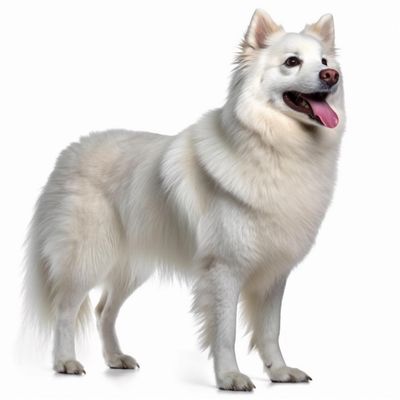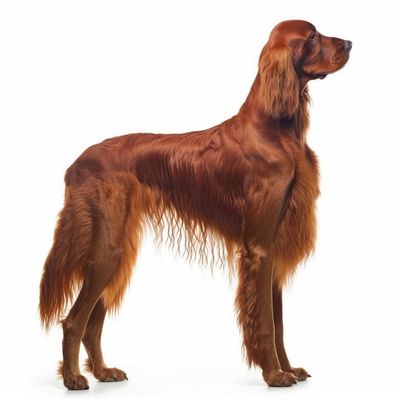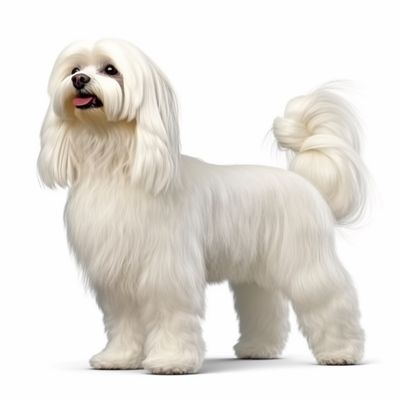American Eskimo Dog - vs - Irish Setter - vs - Maltese

American Eskimo Dogs can vary in size, with Toy, Miniature, and Standard varieties. They weigh between 10-40 lbs and have a height of 9-19 inches.
American Eskimo Dogs have a high energy level and need regular physical and mental stimulation to stay happy and healthy.
American Eskimo Dogs require daily exercise, including walks, playtime, and activities that challenge their minds.
American Eskimo Dogs are intelligent and eager to please, making them highly trainable with consistent, positive reinforcement.
American Eskimo Dogs are intelligent dogs known for their versatility in various dog sports and activities.
American Eskimo Dogs can adapt to different living situations, but their high energy levels and bark tendencies may make them less suited for small spaces like apartments.
American Eskimo Dogs can be good with children, but supervision and proper handling are important to ensure safe interactions.
American Eskimo Dogs can get along well with other pets, especially when raised together. Early socialization is important to ensure they develop good social skills.
American Eskimo Dogs have a thick double coat that allows them to tolerate cold climates well.
American Eskimo Dogs can tolerate hot climates, but they need to be monitored for signs of overheating during exercise. Regular grooming can also help keep them comfortable.
American Eskimo Dogs have a thick double coat that sheds heavily, requiring regular grooming to keep their coats clean and healthy.
American Eskimo Dogs require regular grooming, including brushing several times a week and occasional bathing.
American Eskimo Dogs tend to bark more frequently and may require consistent training to manage their barking.
American Eskimo Dogs are generally healthy dogs but may still require regular veterinary checkups and preventative care.

Irish Setters are large dogs, weighing 60-70 lbs, with a height of 25-27 inches.
Irish Setters have a high energy level and need plenty of physical activity to stay happy and healthy.
Irish Setters require a lot of exercise, including daily walks, play sessions, and activities like fetch or dog sports.
Irish Setters are intelligent and trainable, but they can be easily distracted. Consistent, positive reinforcement is key.
Irish Setters are highly intelligent dogs and can excel in various dog sports and activities, such as agility and obedience.
Irish Setters can adapt to various living situations but are not well-suited for small apartments due to their high energy level.
Irish Setters are good with children, as they are generally friendly, playful, and patient.
Irish Setters can get along well with other pets, especially when raised together.
Irish Setters can tolerate colder temperatures due to their thick, medium-length coats.
Irish Setters can tolerate hot climates but need to be monitored for signs of overheating during exercise.
Irish Setters have a medium-length coat and shed moderately, requiring regular grooming.
Irish Setters require regular grooming, including brushing and occasional trimming, to keep their coats clean and healthy.
Irish Setters have average bark tendencies and may bark for various reasons, such as alerting their owners or during playtime.
Irish Setters are generally healthy, but regular veterinary checkups and preventative care are still necessary.

Maltese have a moderate energy level and enjoy short walks and indoor playtime.
Maltese require minimal exercise, with daily walks and playtime indoors being sufficient.
Maltese are moderately easy to train, but they may require patience and consistency.
Maltese are of average intelligence and can learn new commands with proper training.
Maltese are highly adaptable and do well in various living situations, including apartments and houses.
Maltese are generally okay with kids but are better suited for families with older children who understand how to handle small dogs gently.
Maltese can get along well with other pets when properly socialized.
Maltese can tolerate some cold weather but should be protected from extreme cold with appropriate clothing and shelter.
Maltese can tolerate hot climates reasonably well but should always have access to shade and water.
Maltese require regular grooming, including daily brushing and occasional trims, to maintain their long coats.
Maltese have average bark tendencies and may bark for various reasons, such as alerting their owners or during playtime.
Maltese are generally healthy, but regular veterinary checkups and preventative care are still necessary.



